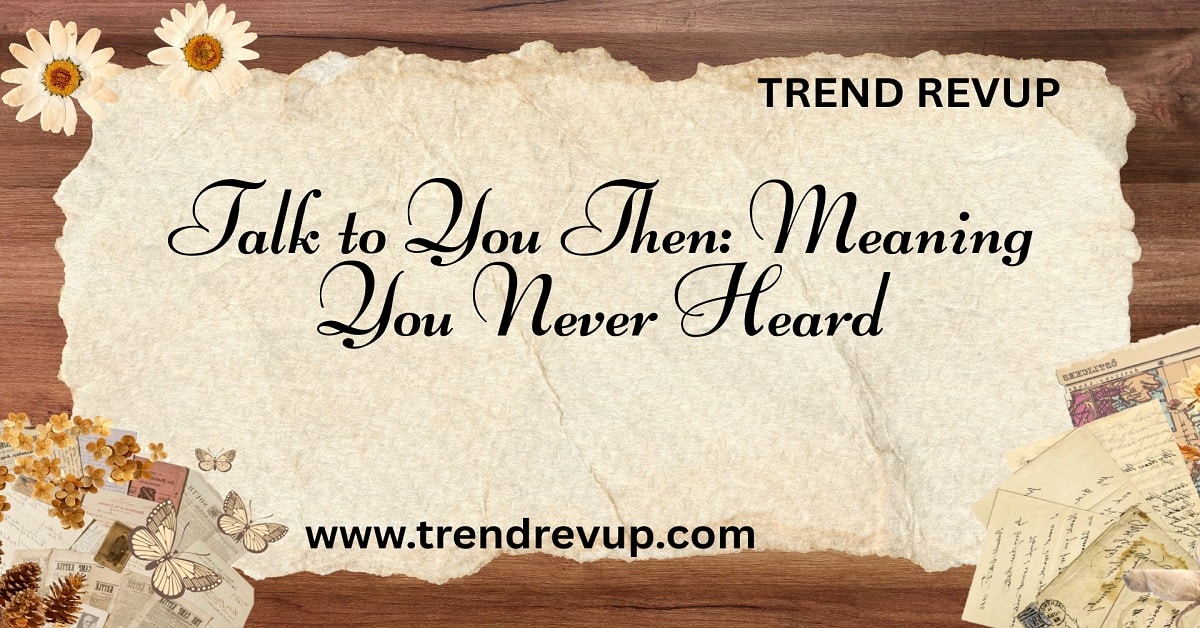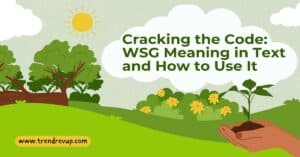Talk to You Then — it’s a phrase you’ve probably used countless times without even thinking about it. But have you ever stopped to wonder why it slips so naturally into your conversations, or what it really communicates about you and your connection with others?
In this article, we’re diving into the meaning, context, and hidden charm behind those simple words. You’ll discover why “Talk to You Then” isn’t just a casual sign-off, but a phrase that can carry warmth, anticipation, and subtle intention. Stick with me you’ll never see it the same way again.
What Does “Talk to You Then” Actually Mean?
Let’s start with the basics before we dive into the rabbit hole of linguistic weirdness. When someone says “talk to you then,” they’re essentially saying “I’ll talk to you at some point in the future.” It’s a casual way of ending a conversation with the understanding that you’ll reconnect later.
But here’s where it gets interesting (and slightly brain-melting): the word “then” usually refers to a specific time that has already been established in the conversation. You know, like “I’ll meet you at 3 PM, and we’ll talk then.” But in “talk to you then,” there often isn’t a specific “then” that’s been mentioned. It’s like pointing at an invisible clock that only exists in the collective unconscious of human conversation.
Think of it as the conversational equivalent of saying “you know, that thing” when referring to something you haven’t actually named. Somehow, miraculously, it works.
The Grammar Police Are Having a Field Day
If you’re the type of person who gets twitchy when someone ends a sentence with a preposition, “talk to you then” probably makes you want to start a support group. From a strict grammatical standpoint, it’s about as logical as saying “I’ll see you there” without mentioning where “there” is.
But here’s the thing about language: it’s not always logical, and that’s perfectly fine. Language evolves based on how people actually use it, not how grammar textbooks think they should use it. “Talk to you then” works because we all collectively agree it works. It’s like a linguistic social contract that nobody actually signed but everyone honors.
The phrase is what linguists call “pragmatically successful” which is fancy academic speak for “it gets the job done, even if it shouldn’t technically make sense.”
Real-Life Scenarios Where This Phrase Thrives
The Vague Plans Conversation
Friend: “We should definitely hang out this weekend!” You: “Absolutely! I’ll figure out my schedule and let you know.” Friend: “Sounds good, talk to you then!”
In this scenario, “then” refers to that future moment when you’ll reconnect to make actual plans. It’s beautifully vague and somehow perfectly clear at the same time.
The Work Call Wind-Down
Colleague: “I think that covers everything for today’s meeting.” You: “Great, I’ll work on those action items.” Colleague: “Perfect, talk to you then!”
Here, “then” is doing some serious heavy lifting, referring to your next scheduled interaction, whatever that might be. Next meeting? Random Slack message? Awkward encounter at the coffee machine? The possibilities are endless!
The Family Check-In
Mom: “Well, I should let you go. You sound busy.” You: “Yeah, things are pretty hectic right now.” Mom: “Okay sweetie, talk to you then!”
Mom’s “then” encompasses that warm, fuzzy understanding that you’ll talk again soon because, well, you always do. It’s less about specific timing and more about the continuation of your relationship.
Why Our Brains Don’t Explode From the Confusion
You might wonder how we navigate these grammatically questionable waters without constantly asking “when is then?” The answer lies in something called contextual inference – our brain’s remarkable ability to fill in conversational gaps.
When someone says “talk to you then,” your brain automatically supplies the missing information based on:
- Your relationship with the person
- The context of your conversation
- Social conventions about communication frequency
- The general vibe of the interaction
It’s like your brain is running a background program that whispers, “Don’t worry about the specifics, you’ll figure it out when you need to.”
The International Mystery of Conversational Endings
Different cultures have their own versions of these delightfully vague conversation enders. In some places, people say “until next time” without specifying when that might be. Others go with “see you around” as if they’re all living in the same small town.
The beauty of these phrases is their universal understanding despite their logical fuzziness. It’s like we’re all part of a secret society where the password is “implied future communication.”
Common Misconceptions and Overthinking Moments
“But When Is Then?”
This is the question that keeps grammar enthusiasts awake at night. The truth is, “then” in this context isn’t about a specific time – it’s about the concept of future connection. Think of it less like a calendar appointment and more like a gentle promise that your conversation isn’t ending forever.
“Should I Ask for Clarification?”
Please don’t. If someone says “talk to you then” and you respond with “when exactly is then?” you’ll probably get a look that suggests they’re questioning your grasp of basic human interaction. The vagueness is a feature, not a bug.
“Is This Rude or Dismissive?”
Not at all! “Talk to you then” is actually quite friendly. It acknowledges that while this particular conversation is ending, the relationship continues. It’s the conversational equivalent of leaving the door open.
The Psychology Behind Vague Future References
There’s something beautifully optimistic about “talk to you then.” It assumes that there will be future conversations, that relationships continue beyond the current moment. It’s a small act of faith in ongoing human connection.
Compare it to more definitive endings like “goodbye” (which literally means “God be with you” and sounds pretty final) or “farewell” (which might as well come with a dramatic cape swirl). “Talk to you then” is casual, assumptive, and hopeful.
When “Talk to You Then” Goes Wrong
Of course, like any conversational tool, this phrase can occasionally backfire:
The Awkward Acquaintance Situation: When someone you barely know uses it, you might find yourself thinking, “Will we though? Will we really talk then?” It’s like they’re being presumptuous about your future communication needs.
The Overly Specific Context: Sometimes people use it even when a specific time HAS been established, creating a weird redundancy: “I’ll call you at 8 PM tonight.” “Great, talk to you then!” “…Yes, that’s what we just established.”
The Infinite Loop Potential: Occasionally, both people will say it simultaneously, creating a brief moment of existential confusion about who exactly will be talking to whom and when.
Embracing the Beautiful Chaos
The thing about “talk to you then” is that it represents something wonderful about human communication: our ability to understand each other even when we’re not being perfectly precise. It’s a reminder that language is less about rigid rules and more about shared understanding.
In a world where we often overthink every text message and analyze every emoji for hidden meaning, there’s something refreshing about a phrase that works precisely because we don’t think about it too hard.
The Evolution of Casual Communication
This phrase is part of a larger trend in modern communication toward informal, assumption-based language. We say “catch you later” without scheduling a specific catching session. We tell people to “take care” without providing care-taking instructions. We “see” each other later through phone calls where no actual seeing occurs.
“Talk to you then” fits perfectly into this tradition of phrases that make emotional sense even when they don’t make literal sense.
Your Turn to Overthink
So there you have it – the delightfully illogical world of “talk to you then.” It’s a phrase that shouldn’t work but does, that creates connection through vagueness, and that somehow manages to be both meaningless and meaningful at the same time.
Next time someone says it to you, you can either smile knowingly at this shared human quirk, or you can drive yourself slightly crazy trying to pinpoint exactly when “then” is supposed to be. Either way, you’ll probably end up using the phrase yourself eventually – because despite its logical shortcomings, it just feels right.
Have you ever found yourself using “talk to you then” without thinking about it? Or are you one of those people who gets irrationally bothered by vague conversational endings? Share your thoughts – and don’t worry, we can talk about it more… well, you know when.
Talk to You Then: Meaning You Never Heard
Picture this: You’re wrapping up a phone call with your friend, and they cheerfully say, “Alright, talk to you then!” You pause. Wait… talk to me when exactly? Did they just accidentally create a temporal paradox in casual conversation?
If you’ve ever found yourself scratching your head at this phrase, you’re definitely not alone. “Talk to you then” is one of those sneaky little expressions that sounds perfectly normal until you actually think about it. Then suddenly, it becomes this linguistic mystery that makes you question everything you thought you knew about the English language.
Welcome to the wonderful world of conversational shortcuts, where logic goes to take a nap and everyone just… gets it somehow.
What Does “Talk to You Then” Actually Mean?
Let’s start with the basics before we dive into the rabbit hole of linguistic weirdness. When someone says “talk to you then,” they’re essentially saying “I’ll talk to you at some point in the future.” It’s a casual way of ending a conversation with the understanding that you’ll reconnect later.
But here’s where it gets interesting (and slightly brain-melting): the word “then” usually refers to a specific time that has already been established in the conversation. You know, like “I’ll meet you at 3 PM, and we’ll talk then.” But in “talk to you then,” there often isn’t a specific “then” that’s been mentioned. It’s like pointing at an invisible clock that only exists in the collective unconscious of human conversation.
Think of it as the conversational equivalent of saying “you know, that thing” when referring to something you haven’t actually named. Somehow, miraculously, it works.
The Grammar Police Are Having a Field Day
If you’re the type of person who gets twitchy when someone ends a sentence with a preposition, “talk to you then” probably makes you want to start a support group. From a strict grammatical standpoint, it’s about as logical as saying “I’ll see you there” without mentioning where “there” is.
But here’s the thing about language: it’s not always logical, and that’s perfectly fine. Language evolves based on how people actually use it, not how grammar textbooks think they should use it. “Talk to you then” works because we all collectively agree it works. It’s like a linguistic social contract that nobody actually signed but everyone honors.
The phrase is what linguists call “pragmatically successful” – which is fancy academic speak for “it gets the job done, even if it shouldn’t technically make sense.”
Real-Life Scenarios Where This Phrase Thrives
The Vague Plans Conversation
Friend: “We should definitely hang out this weekend!” You: “Absolutely! I’ll figure out my schedule and let you know.” Friend: “Sounds good, talk to you then!”
In this scenario, “then” refers to that future moment when you’ll reconnect to make actual plans. It’s beautifully vague and somehow perfectly clear at the same time.
The Work Call Wind-Down
Colleague: “I think that covers everything for today’s meeting.” You: “Great, I’ll work on those action items.” Colleague: “Perfect, talk to you then!”
Here, “then” is doing some serious heavy lifting, referring to your next scheduled interaction, whatever that might be. Next meeting? Random Slack message? Awkward encounter at the coffee machine? The possibilities are endless!
The Family Check-In
Mom: “Well, I should let you go. You sound busy.” You: “Yeah, things are pretty hectic right now.” Mom: “Okay sweetie, talk to you then!”
Mom’s “then” encompasses that warm, fuzzy understanding that you’ll talk again soon because, well, you always do. It’s less about specific timing and more about the continuation of your relationship.
Why Our Brains Don’t Explode From the Confusion
You might wonder how we navigate these grammatically questionable waters without constantly asking “when is then?” The answer lies in something called contextual inference – our brain’s remarkable ability to fill in conversational gaps.
When someone says “talk to you then,” your brain automatically supplies the missing information based on:
- Your relationship with the person
- The context of your conversation
- Social conventions about communication frequency
- The general vibe of the interaction
It’s like your brain is running a background program that whispers, “Don’t worry about the specifics, you’ll figure it out when you need to.”
The International Mystery of Conversational Endings
Different cultures have their own versions of these delightfully vague conversation enders. In some places, people say “until next time” without specifying when that might be. Others go with “see you around” as if they’re all living in the same small town.
The beauty of these phrases is their universal understanding despite their logical fuzziness. It’s like we’re all part of a secret society where the password is “implied future communication.”
Common Misconceptions and Overthinking Moments
“But When Is Then?”
This is the question that keeps grammar enthusiasts awake at night. The truth is, “then” in this context isn’t about a specific time – it’s about the concept of future connection. Think of it less like a calendar appointment and more like a gentle promise that your conversation isn’t ending forever.
“Should I Ask for Clarification?”
Please don’t. If someone says “talk to you then” and you respond with “when exactly is then?” you’ll probably get a look that suggests they’re questioning your grasp of basic human interaction. The vagueness is a feature, not a bug.
“Is This Rude or Dismissive?”
Not at all! “Talk to you then” is actually quite friendly. It acknowledges that while this particular conversation is ending, the relationship continues. It’s the conversational equivalent of leaving the door open.
The Psychology Behind Vague Future References
There’s something beautifully optimistic about “talk to you then.” It assumes that there will be future conversations, that relationships continue beyond the current moment. It’s a small act of faith in ongoing human connection.
Compare it to more definitive endings like “goodbye” (which literally means “God be with you” and sounds pretty final) or “farewell” (which might as well come with a dramatic cape swirl). “Talk to you then” is casual, assumptive, and hopeful.
When “Talk to You Then” Goes Wrong
Of course, like any conversational tool, this phrase can occasionally backfire:
The Awkward Acquaintance Situation: When someone you barely know uses it, you might find yourself thinking, “Will we though? Will we really talk then?” It’s like they’re being presumptuous about your future communication needs.
The Overly Specific Context: Sometimes people use it even when a specific time HAS been established, creating a weird redundancy: “I’ll call you at 8 PM tonight.” “Great, talk to you then!” “…Yes, that’s what we just established.”
The Infinite Loop Potential: Occasionally, both people will say it simultaneously, creating a brief moment of existential confusion about who exactly will be talking to whom and when.
Embracing the Beautiful Chaos
The thing about “talk to you then” is that it represents something wonderful about human communication: our ability to understand each other even when we’re not being perfectly precise. It’s a reminder that language is less about rigid rules and more about shared understanding.
In a world where we often overthink every text message and analyze every emoji for hidden meaning, there’s something refreshing about a phrase that works precisely because we don’t think about it too hard.
The Evolution of Casual Communication
This phrase is part of a larger trend in modern communication toward informal, assumption-based language. We say “catch you later” without scheduling a specific catching session. We tell people to “take care” without providing care-taking instructions. We “see” each other later through phone calls where no actual seeing occurs.
“Talk to you then” fits perfectly into this tradition of phrases that make emotional sense even when they don’t make literal sense.
Your Turn to Overthink
So there you have it – the delightfully illogical world of “talk to you then.” It’s a phrase that shouldn’t work but does, that creates connection through vagueness, and that somehow manages to be both meaningless and meaningful at the same time.
Next time someone says it to you, you can either smile knowingly at this shared human quirk, or you can drive yourself slightly crazy trying to pinpoint exactly when “then” is supposed to be. Either way, you’ll probably end up using the phrase yourself eventually – because despite its logical shortcomings, it just feels right.
Have you ever found yourself using “talk to you then” without thinking about it? Or are you one of those people who gets irrationally bothered by vague conversational endings? Share your thoughts – and don’t worry, we can talk about it more… well, you know when.



